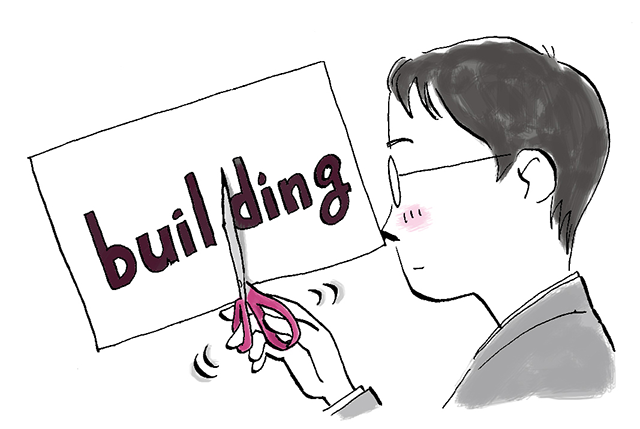Japanese Words that Resemble English Words

In Japanese there are many words made from English.
In order to make them, there are various patterns.
Examples that omit the latter parts of long words:
- building → ビル (biru = buil)
- (cash) register → レジ (reji = regi)
- celebrity → セレブ (serebu = celeb)
- infrastructure → インフラ (infura = infra)
- maniac → マニア (mania = mania)
- professional → プロ (puro = pro)
- restructure → リストラ (risutora = restru)
- supermarket → スーパー (su-pa- = super)
- television → テレビ (terebi = televi)
Examples that omit the former or latter words of compound nouns:
- apartment house → アパート (apa-to = apart)
- classical music → クラシック (kurashikku = classic)
- convenience store → コンビニ (konbini = conveni)
- department store → デパート (depar-to = depart)
- ice cream → アイス (aisu = ice)
- sewing machine →ミシン (mishin = machine)
Examples of shortened words created by combining shortened parts of compound nouns:
- air conditioner → エアコン (eakon = air con)
- patrol car → パトカー (patoka- = pat car)
- personal computer → パソコン (pasokon = perso com)
- sexual harassment → セクハラ (sekuhara = sex hara)
Examples of English words that differ from the original word:
- autograph → サイン (sain = sign)
- cards →トランプ (toranpu = trump)
- casual → ラフ (rafu = rough)
- cheating → カンニング (kannningu = cunning)
- complain → クレーム (kure-mu = claim)
- conditioner → リンス (rinsu = rinse)
- condominium → マンション (manshon = mansion)
- expert → ベテラン (beteran = veteran)
- figure → スタイル (sutairu = style)
- go for it → ファイト (faito = fight)
- microwave → ( 電でん 子し ) レンジ (renji = range)
- outlet / socket → コンセント (konsento = consent)
- product tester → モニター (monita- = monitor)
- reception desk → フロント (furonto = front)
- sensitive → ナイーブ (nai-bu = naive)
- slim → スマート (suma-to = smart)
- steering wheel → ハンドル (handoru = handle)
- sticker →シール (shi-ru = seal)
- TV personality → タレント (tarento = talent)
Examples of words that resemble English vocabulary:
- additional time → ロスタイム (rosu taimu = loss time)
- alumnus → オービー (OB / old boy)
- blender → ジューサー (jusa- = juicer)
- body search → ボディーチェック (bodhi chekku = body check)
- close personal contact → スキンシップ (sukinnshippu = skinship)
- convertible car →オープンカー (o-pun ca- = open car)
- custom-made → オーダーメイド (o-da- meido = order made)
- customer service → アフター サービス (afuta- sa-bisu = after service)
- electric carpet → ホットカーペット (hotto ca-petto = hot carpet)
- gas station → ガソリンスタンド (gasorin sutando / gasoline stand)
- gig venue → ライブハウス (raibu hausu = live house)
- guard → ガードマン (ga-doman = guardman)
- key ring / key chain → キ ー ホ ル ダ ー (ki- horuda- = key holder)
- laptop computer → ノートパソコン (no-to pasokon / note personal computer)
- marker → サインペン (sainn pen = sign pen)
- media → マスコミ (masukomi = mass communication)
- motorbike → オートバイ (o-tobai = auto bi)
- night game → ナイター (naita- = nighter)
- office worker → サラリーマン (sarari-man = salaryman) / オーエル (OL = office lady)
- on-line shopping → ネットショッピング (netto shoppingu = net shopping)
- panty hose / tights → パンスト (pansuto = panty stocking)
- plastic bottle → ペットボトル (petto botoru = pet bottle)
- priority seat → シルバーシート (siruba- shi-to = silver seat)
- renovation → リフォーム (rifo-mu = reform)
- roller-coaster → ジェットコースター (jetto ko-suta- = jet coaster)
- slogan → キャッチコピー (kyattchi copi- = catch copy)
- stroller → ベビーカー (bebi- ka- = baby car)
- studio (apartment) → ワンルームマンション (wan ru-mu manshon = one room mansion)
- ticket agency → プレイガイド (purei gaido = play guide)
- transvestite → ニューハーフ (nyu-ha-fu = new half)
Examples of words taken from languages other than English or from a different concept:
- buffet → バイキング (baiking = Viking / said to originate from the Swedish style of eating)
- part time job → アルバイト (arubaito = from the German ‘arbeit’ ) / パート (pa-to / part)
- rumor → デマ (dema / from the German ‘demagogie’)
- stapler → ホチキス (hochikisu / from the Hotchikiss brand who first imported staplers to Japan)
These words are used daily in Japanese.
